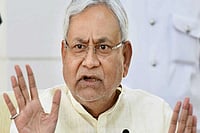Statement on the debate in the Lok Sabha on Political Science textbooks
We have followed the discussion today in the Lok Sabha on the use of cartoons in Democratic Politics I: Textbook in Political Science for class IX published by the National Council of Educational Research and Training (NCERT). While it was gratifying to see the parliament devote considerable time to discussing the content of what is taught to school students, it was sad to discover that the proceedings in this supreme decision making body did not appear to have had the benefit of full information or an informed perspective about the matter being discussed. Most of the members who spoke appeared to rely upon a bunch of select cartoons photocopied from this book and did not seem to be familiar with the content and the approach of this and other textbooks.
As academics associated with the preparation of these books in an advisory capacity, we would like to clarify the following:
1. The book under discussion was developed after extensive consultations by a Textbook Development Committee over nearly one year. The Committee comprised some of the leading Political Scientists and educationists (listed in the book) which held consultation with a number of school teachers and educationists. The book reflected the collective wisdom of this group. The final draft was duly placed before and approved by a Monitoring Committee appointed by the Ministry of HRD that comprised some of the best known academics and intellectuals in the country. We felt that most of the speeches in the Lok Sabha today did not take this into account.
2. The decision to include cartoons in this book followed from the pedagogical perspective set out in the National Curriculum Framework. This involved moving away from bookish learning and linking students' life at school to their life outside. Specifically all the Political Science textbooks tried to move away from the legacy of descriptive or abstract textbooks in favour of books that are engaging, interactive and which encourage questioning. Cartoons and other visuals are an integral part of this new approach. They are not meant just for visual relief or fun, cartoons cultivate students' ability to relate the book to their own life and develop critical thinking. With this in mind, the book contains a selection of some of the best cartoons from all over the world including our country. These cartoons need to be read together with the accompanying text. Over the last few years the feedback received from the students has highlighted their appreciation of the cartoons. We have so far found little reason to share the apprehension of many speakers in the Lok Sabha that cartoons could vitiate the tender mind of students.
3. The two books Democratic Politics I and II (meant for class 9 and 10 respectively) have been written specifically with a view to affirming the Constitutional values, especially deepening students' faith in democracy, democratic institutions and democratic processes. Experience of teaching-learning all over the world shows that such values cannot be inculcated by preaching. Deepening faith in democracy requires that the textbook takes into account popular impressions that the students receive and provide a convincing response. This is exactly what both these textbooks do. We think that these books offer a fairly robust defence of politics in a democratic set up. We were shocked to learn therefore that these books were presented in the Lok Sabha as an attack on politics, politicians and democracy. Nothing can be farther from the truth.
As the supreme democratic institution, the parliament is entitled and indeed mandated to discuss any matter concerning how the future generations of citizen need to be initiated into democratic politics. At the same time, we believe that there should be a due process for withdrawing or amending textbooks prepared by autonomous institutions following a duly established procedure. We were therefore disappointed to see that the matter was settled on the floor of the house after a debate that was less than fully informed, without taking into account the views of anyone associated with the textbook preparation
The issues raised in today's debate go beyond just a few cartoons or one set of textbooks. The decisions announced on the floor of the house today could mean rolling back of the textbook reforms introduced through the National Curriculum Framework. We believe that such momentous decisions concerning our future generations must involve a wider, national debate.
Yogendra Yadav,
Senior Fellow,
Centre for the Study of Developing Societies,
29 Rajpur Road,
Delhi 110054
Suhas Palshikar
Professor, Dept of Politics,
University of Pune
Pune 411007
***
Elsewhere: Dangers of Deletion by Yogendra Yadav
























